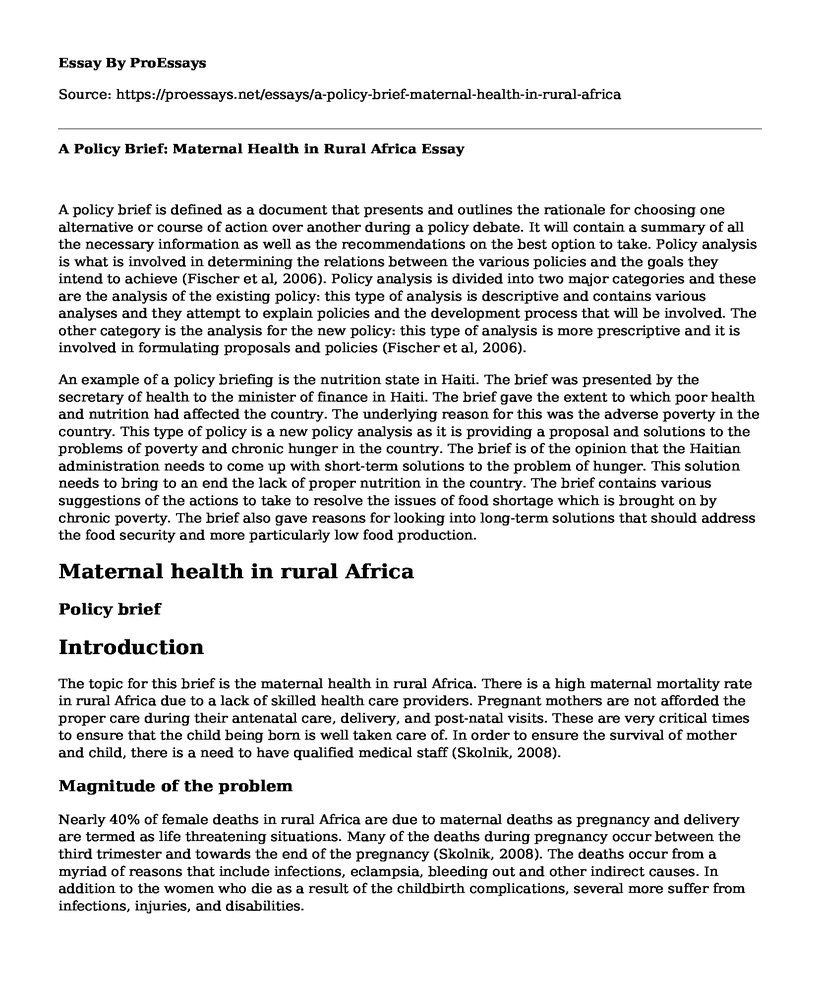A policy brief is defined as a document that presents and outlines the rationale for choosing one alternative or course of action over another during a policy debate. It will contain a summary of all the necessary information as well as the recommendations on the best option to take. Policy analysis is what is involved in determining the relations between the various policies and the goals they intend to achieve (Fischer et al, 2006). Policy analysis is divided into two major categories and these are the analysis of the existing policy: this type of analysis is descriptive and contains various analyses and they attempt to explain policies and the development process that will be involved. The other category is the analysis for the new policy: this type of analysis is more prescriptive and it is involved in formulating proposals and policies (Fischer et al, 2006).
An example of a policy briefing is the nutrition state in Haiti. The brief was presented by the secretary of health to the minister of finance in Haiti. The brief gave the extent to which poor health and nutrition had affected the country. The underlying reason for this was the adverse poverty in the country. This type of policy is a new policy analysis as it is providing a proposal and solutions to the problems of poverty and chronic hunger in the country. The brief is of the opinion that the Haitian administration needs to come up with short-term solutions to the problem of hunger. This solution needs to bring to an end the lack of proper nutrition in the country. The brief contains various suggestions of the actions to take to resolve the issues of food shortage which is brought on by chronic poverty. The brief also gave reasons for looking into long-term solutions that should address the food security and more particularly low food production.
Maternal health in rural Africa
Policy brief
Introduction
The topic for this brief is the maternal health in rural Africa. There is a high maternal mortality rate in rural Africa due to a lack of skilled health care providers. Pregnant mothers are not afforded the proper care during their antenatal care, delivery, and post-natal visits. These are very critical times to ensure that the child being born is well taken care of. In order to ensure the survival of mother and child, there is a need to have qualified medical staff (Skolnik, 2008).
Magnitude of the problem
Nearly 40% of female deaths in rural Africa are due to maternal deaths as pregnancy and delivery are termed as life threatening situations. Many of the deaths during pregnancy occur between the third trimester and towards the end of the pregnancy (Skolnik, 2008). The deaths occur from a myriad of reasons that include infections, eclampsia, bleeding out and other indirect causes. In addition to the women who die as a result of the childbirth complications, several more suffer from infections, injuries, and disabilities.
Affected populations
Many of the women who die as a result of pregnancy-related complications are the women who live in rural areas. They do not have access to adequate health services. Many of them are poor and there are no medical facilities in the areas in which they reside. The medical centers that are equipped and have skilled personnel are mostly located n areas that are economically well off and these areas have access to clean sanitary provisions such as water and proper drainage. Women who give birth during their adolescence also risk having underdeveloped and low weight babies.
Priority action steps
The best way to decrease the rate of maternal mortality there is a need to have improved healthcare and this includes having access to skilled medical staff. Creating community-based training programs for midwives would go a long way in averting many of these problems faced by the pregnant mothers. These midwives will be of great help to mothers who cannot make the journey to medical centers and they will assist them in delivery (Skolnik, 2008).
Conclusion
Proper sanitation, nutrition, and knowledge of obstetrics by the midwives will decrease the maternal mortality. Many of the deaths are preventable if only by giving the right information to the mothers and ensuring they are aware of the risks involved if they do not take care of themselves during pregnancy.
References
Skolnik, R. (2008) Nutrition and Global Health; Essentials of Global Health. Sudbury: Jones and Bartlett Publishers
Fischer, Frank; Miller, Gerald J.; Sidney Mara S. (2006). Handbook of Public Policy Analysis: Theory, Methods, and Politics. New York: Marcel Dekker.
Cite this page
A Policy Brief: Maternal Health in Rural Africa. (2021, Mar 19). Retrieved from https://proessays.net/essays/a-policy-brief-maternal-health-in-rural-africa
If you are the original author of this essay and no longer wish to have it published on the ProEssays website, please click below to request its removal:
- Research Letter Under Wilfred Lauriers Master of Social Work Program
- The Future of Internet in Canada - Essay Sample
- Essay Sample on Nursing and Social Media Use at Work
- Essay Sample on Military Healthcare Practitioners' Dual Loyalty Dilemma: Confidentiality & Ethics
- Transgender Poor Nutrition: Adverse Health Impacts & Inequalities - Essay Sample
- Essay Sample on Organ Transplants: Improving Lives Through Technology
- Essay on Nurse-Led Education Program to Ensure Patient Safety for Influenza Prevention







